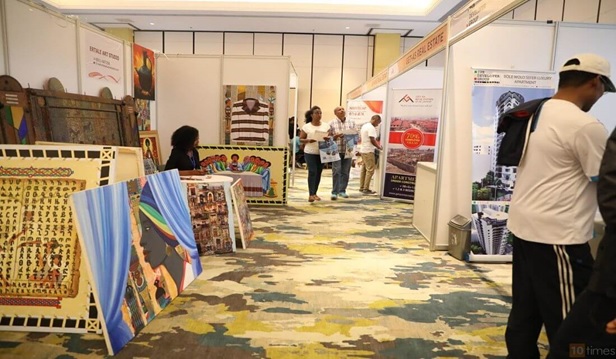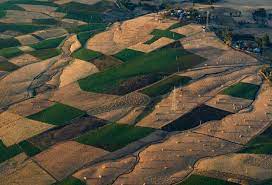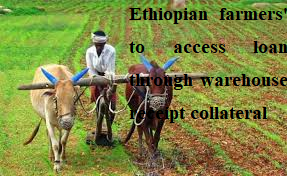
Although the government is taking steps to curb the rising cost of living in the country, the problem remains unresolved. Evidence suggests that the high cost of living is being felt not only locally but also globally.
In addition to the pressures in Ethiopia, tensions in the outside world have exacerbated the problem. However, one of the steps being taken to alleviate the high cost of living is the direct link between manufacturer and consumers by establishing a healthy trading system.
Strengthening cooperatives and making them accessible to the public is key to this. In particular, the unions are working harder than ever to alleviate the shortage of items and commodity prices in urban areas.
For the first time, the Addis Ababa City Administration Cooperative Agency organized an exhibition, under a theme “Cooperative for a peaceful and stable market system,” It is one of the city-wide cooperative exhibitions, bazaars and symposiums organized for four consecutive days.
One of the steps the government is taking to stabilize the market and support the economy is to improve commodity supply in Addis Ababa and prevent undue price hikes and to break the cycle of brokers in the trading system.
Cooperatives in the country are believed to be playing a key role in this regard. Consumers the Ethiopian Press Agency met at the Addis Ababa Exhibition Center in May 18-21, 2014 also shared the view that the preparation of similar exhibitions and bazaars plays an important role in stabilizing the market.
Dawit Asfaw, one of the participants, conveyed his message to the Ethiopian Press Agency reporters saying the public have left the regular market and come to the exhibition center. He also said the location of the exhibition and bazaar, especially the cooperatives, is much better than the outside market price of all products.
We found him buying honey at the time; he recalled that he had bought a Bonga Honey at the same place five months ago and said that the honey was clean and reasonably priced.
In such markets, the people can buy quality and fresh products with an affordable price. He said the cooperatives have a significant role to play in stabilizing the market. On the same day, he bought one kilogram of Bonga white honey for 260 birr and five kilograms of corn flour for 140 Birr and fifty cents.
According to Dawit, Cooperatives play an important role in stabilizing the current cost of living. However, he said it was important to provide the necessary support and assistance to the unions so that they could provide more services.
If the community can go and buy wherever the associations are located, it will be able to build the capacity of the associations. It also allows them to offer a wide range of services.
The government must work to strengthen and support them and make them accessible to the public. In Addis Ababa, the Sunday market, which has already started, should be strengthened as an option.
In addition to the regular Sunday market, the bazaar and exhibition, which will be held at various times, will also be able to stabilize the market if it opens in a month or two.
Hanna Mamuye, for her part, who seconded Dawits’s views, said the fact that the cooperatives having and affording various products in one place is good by itself and can stabilize the market.
Although she came from a nearby place from the Exhibition Center, she noted that even those far away could benefit from a similar Sunday market.
Hanna, whom the Ethiopian Press Agency met at the time, bought a kilo of corrugated iron for 100 birr. She said the price of Teff, which was sold 50 to 54 birr per kilo, is currently being sold for 44 to 46 birr. In the case of oil, though, there is much that should be done.
There is imported oil that is being sold for more than a thousand birr. However, she said they have bought domestically produced nougat oil for 870 birr and that the government should offer this option.
The reporters have also seen that some of the industrial products are dry and liquid detergents that are reasonably priced. For example, they have witnessed that five liters of laundry soap, which was sold for more than 300 Birr, is now being sold for 200 to 250 Birr.
Bezabih Bekele, Chairman of the Board from South Kafa Zone, Kafa Forest Honey Union, presented Honey and Cardamom. He said the association has 34 associations and consists of 9,000 farmers.
In 2013, they were able to export honey to Germany, but now they are limited to supply to the domestic market due to the high demand for domestic honey. However, he noted that the market place is a problem for making it widely accessible in various regional cities, including Addis Ababa. He said it is important that they be able to sell their products at the Exhibition Center for four days free of charge. They also say that it provides a good opportunity to create market linkages beyond sales. In the past, they have been able to create a wide range of market connections, not just directly to the consumer. According to Bezabeh, they are selling one kilogram of honey for 260 Birr and one kilogram of coriander for 100 Birr according to the decision of the board.
He said it would benefit consumers and stabilize the market. Ten quintals of honey and three quintals of coriander were also supplied to the four-day bazaar. In addition to the quantity of products offered to the market, they found an exporter in the Bazaar market, cardamom, and they agreed on a price, quality and timeline for the supply of 10 quintals of fermented curry. He said the preparatory work has already started and such forums are especially important for creating market linkages.
Ashagre Admasu, head of Yirgachefe Farmers’ Cooperative Coffee Cooperative, on his part, said he has supplied roasted coffee to consumers at affordable prices. As a result, one kilogram of ground roasted coffee costs 460 birr. This means that it sells for more than 570 Birr abroad. According to Ashagre, the coffee plantation is owned by farmers in Yirgachefe.
He said the association comprises more than 40,000 farmers. The coffee, which they received from the farmers, is roasted, grounded and packaged at a processing factory in the Kaliti training area. The coffee is available at various hotels, supermarkets including Hilton Hotel.
In addition to the permanent market, participating in such a bazaar will not only create more market opportunities but also make it more accessible to the consumer, he said. In particular, given the current high cost of living, they are offering less than what they are offering for the export market, which is a great opportunity for the benefit of the community and the promotion of coffee, he said.
Addis Ababa City Administration Cooperative Agency Head Gizachew Ali said, “Cooperatives can be problem solvers. He said the exhibition and bazaar are aimed at reducing the artificial cost of living and creating a stable market.
In order to solve the problem of supply, the problem was identified through extensive discussions with the farmers. Cooperatives are being worked on as a solution to this problem.
Recognizing the importance of such a forum beyond the Sunday Market, the city administration has allocated one billion birr to the cooperative agency. As a result, they have imported a wide range of products, including Teff and wheat flour, he said. They say they are replacing the product from the bottom up and could extend into next winter. He said they are working with regional farmers on fruits and vegetables. The exhibition and bazaar was attended by institutions from six regions outside the city, organized by various cooperatives, and had direct contact with the cooperative sector.
It aims to exchange experiences between the unions, reduce financial debt and co-operation, create sustainable market linkages and interactions, and build the image of the unions. Over the course of the four days, 178 cooperatives and various institutions presented more than 456 types of products and introduced cooperative products and services.
BY LAKACHEW ATINAFU
The Ethiopian Herald 3 June 2022





